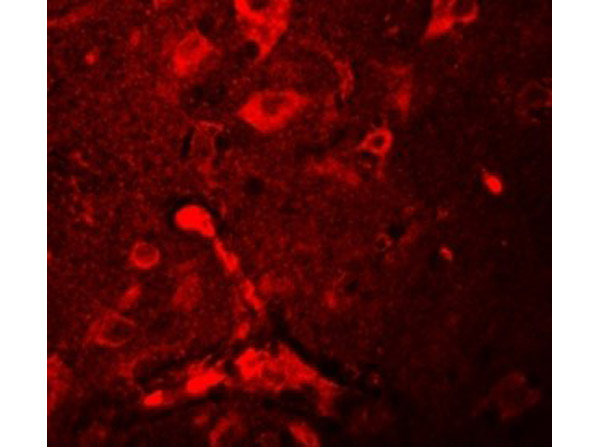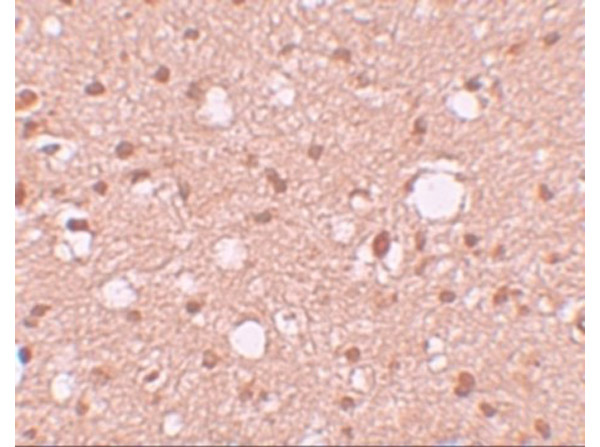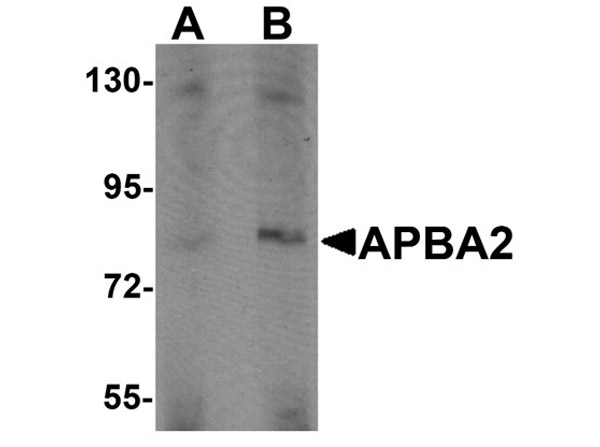Datasheet is currently unavailable. Try again or CONTACT US
APBA2 Antibody
Rabbit Polyclonal
600-401-Y30
100 µg
Liquid (sterile filtered)
WB, ELISA, IHC, IF
Human
Rabbit
Shipping info:
$50.00 to US & $70.00 to Canada for most products. Final costs are calculated at checkout.
Product Details
Anti-APBA2 (RABBIT) Antibody - 600-401-Y30
APBA2 Antibody, X11L, MINT2, LIN-10, HsT16821, X11-BETA, D15S1518E, MGC,14091, X11L, Amyloid beta A4 precursor protein-binding family A member 2, Adapter protein X11beta, Mint-2
Rabbit
Polyclonal
IgG
Target Details
APBA2 - View All APBA2 Products
Human
Conjugated Peptide
Anti-APBA2 antibody was prepared from whole rabbit serum produced by repeated immunizations with an 18 amino acid synthetic peptide near the internal region of human APBA2.
Anti-APBA2 Antibody was affinity purified from monospecific antiserum by immunoaffinity chromatography. Cross reactivity with APBA2 from other sources has not been determined.
Application Details
ELISA, IF, IHC, WB
Anti-APBA2 Antibody has been tested for use in ELISA, Western Blotting, Immunohistochemistry and Immunofluorescence. Specific conditions for reactivity should be optimized by the end user. Expect a band at approximately 83 kDa in Western Blots of specific cell lysates and tissues.
Formulation
1 mg/mL by UV absorbance at 280 nm
0.01 M Sodium Phosphate, 0.25 M Sodium Chloride, pH 7.2
0.02% (w/v) Sodium Azide
None
Shipping & Handling
Dry Ice
Store vial at -20° C prior to opening. Aliquot contents and freeze at -20° C or below for extended storage. Avoid cycles of freezing and thawing. Centrifuge product if not completely clear after standing at room temperature. This product is stable for several weeks at 4° C as an undiluted liquid. Dilute only prior to immediate use.
Expiration date is one (1) year from date of receipt.
APBA2, a member of the X11 protein family, is a phosphotyrosine-binding domain protein and is a neuronal adapter protein that interacts with amyloid precursor protein (APP) and neuritic plaques in the brains of patients with Alzheimer's disease. It stabilizes APP and inhibits production of proteolytic APP fragments including the Abeta peptide that is deposited in the brains of Alzheimer's disease patients. APBA2 is believed to be involved in signal transduction processes and is also regarded as a putative vesicular trafficking protein in the brain that can form a complex with the potential to couple synaptic vesicle exocytosis to neuronal cell adhesion. Recent reports suggest that it may also be a candidate gene for autism.
This product is for research use only and is not intended for therapeutic or diagnostic applications. Please contact a technical service representative for more information. All products of animal origin manufactured by Rockland Immunochemicals are derived from starting materials of North American origin. Collection was performed in United States Department of Agriculture (USDA) inspected facilities and all materials have been inspected and certified to be free of disease and suitable for exportation. All properties listed are typical characteristics and are not specifications. All suggestions and data are offered in good faith but without guarantee as conditions and methods of use of our products are beyond our control. All claims must be made within 30 days following the date of delivery. The prospective user must determine the suitability of our materials before adopting them on a commercial scale. Suggested uses of our products are not recommendations to use our products in violation of any patent or as a license under any patent of Rockland Immunochemicals, Inc. If you require a commercial license to use this material and do not have one, then return this material, unopened to: Rockland Inc., P.O. BOX 5199, Limerick, Pennsylvania, USA.



